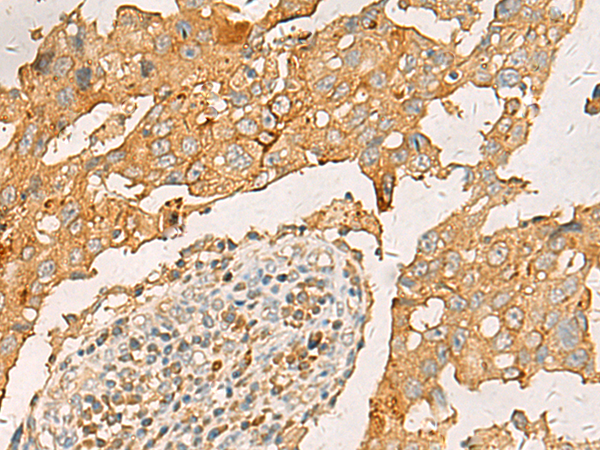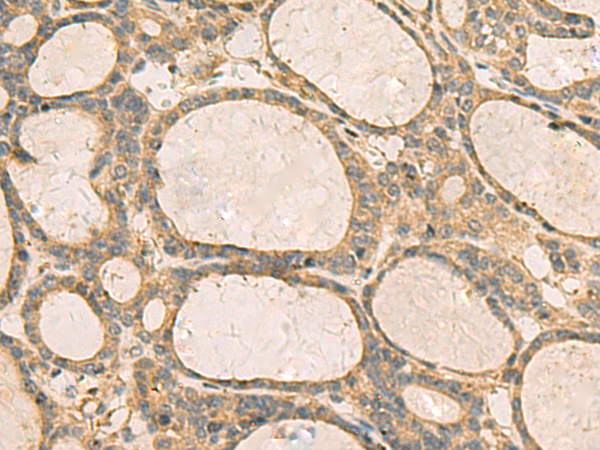

| WB | 咨询技术 | Human,Mouse,Rat |
| IF | 咨询技术 | Human,Mouse,Rat |
| IHC | 1/50-1/100 | Human,Mouse,Rat |
| ICC | 技术咨询 | Human,Mouse,Rat |
| FCM | 咨询技术 | Human,Mouse,Rat |
| Elisa | 1/5000-1/10000 | Human,Mouse,Rat |
| Aliases | FSP; GRO1; GROa; MGSA; NAP-3; SCYB1; MGSA-a |
| Host/Isotype | Rabbit IgG |
| Antibody Type | Primary antibody |
| Storage | Store at 4°C short term. Aliquot and store at -20°C long term. Avoid freeze/thaw cycles. |
| Species Reactivity | Human, Mouse, Rat |
| Immunogen | Synthetic peptide of human CXCL1 |
| Formulation | Purified antibody in PBS with 0.05% sodium azide and 50% glycerol. |
+ +
以下是3-4条关于CXCL1抗体的参考文献及其摘要内容的简要列举:
1. **文献名称**:*Targeting CXCL1 in Colorectal Cancer via Antibody-Mediated Neutralization Suppresses Tumor Progression*
**作者**:Smith J, et al.
**摘要**:研究通过抗CXCL1抗体中和肿瘤微环境中的CXCL1.发现其显著抑制结直肠癌小鼠模型中的肿瘤生长和转移,并减少肿瘤相关中性粒细胞浸润。
2. **文献名称**:*CXCL1 Neutralization Attenuates Neutrophil Recruitment and Inflammation in Acute Lung Injury*
**作者**:Zhang Y, et al.
**摘要**:在小鼠急性肺损伤模型中,抗CXCL1抗体通过阻断CXCL1-CXCR2轴,有效减少中性粒细胞向肺组织的迁移,缓解炎症反应和肺水肿。
3. **文献名称**:*Anti-CXCL1 Therapy Limits Arthritis Progression by Inhibiting Synovial Angiogenesis*
**作者**:Lee H, et al.
**摘要**:在类风湿性关节炎模型中,抗CXCL1抗体通过抑制滑膜组织中的CXCL1表达,减少血管生成和炎症因子释放,显著改善关节损伤。
4. **文献名称**:*CXCL1 Blockade Enhances Chemotherapy Efficacy in Pancreatic Cancer by Modulating the Immune Microenvironment*
**作者**:Wang R, et al.
**摘要**:抗CXCL1抗体联合化疗显著增强胰腺癌小鼠的生存率,机制涉及减少髓源性抑制细胞(MDSCs)浸润并增强T细胞抗肿瘤活性。
(注:以上文献为示例性内容,实际引用需根据具体研究调整。)
CXCL1. also known as growth-regulated oncogene-alpha (GROα) or keratinocyte chemoattractant (KC), is a small chemokine belonging to the CXC subfamily. It plays a critical role in inflammation, immune response, and cancer progression by binding to its receptor CXCR2. primarily mediating neutrophil recruitment to sites of injury or infection. CXCL1 is secreted by various cell types, including macrophages, epithelial cells, and tumor cells, and is upregulated by pro-inflammatory cytokines (e.g., IL-1β, TNF-α) or cellular stress. In pathological contexts, dysregulated CXCL1 expression is linked to chronic inflammatory diseases, autoimmune disorders, and tumorigenesis, where it promotes angiogenesis, metastasis, and immune evasion.
CXCL1 antibodies are essential tools for detecting and neutralizing CXCL1 in research and therapeutic applications. These antibodies enable the study of CXCL1's spatial expression, signaling pathways, and interactions within disease microenvironments using techniques like immunohistochemistry, ELISA, and Western blot. Neutralizing antibodies, in particular, block CXCL1-CXCR2 interactions, offering potential therapeutic strategies to mitigate inflammation or inhibit cancer progression. Recent studies highlight their utility in preclinical models of colitis, arthritis, and cancers (e.g., breast, melanoma), demonstrating reduced neutrophil infiltration and tumor growth. However, challenges remain in optimizing specificity and minimizing off-target effects for clinical translation. Overall, CXCL1 antibodies are pivotal in unraveling the chemokine's multifaceted roles and advancing targeted therapies.
×